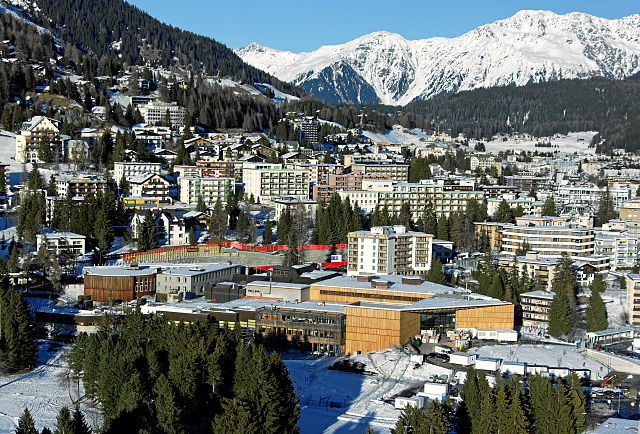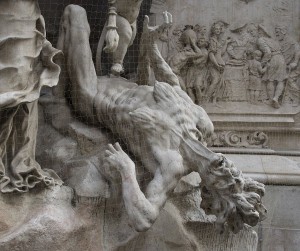
The World Economic Forum, AKA the “annual summit for the one per cent,” kicks off in Davos-Klosters, Switzerland, tomorrow. Subjects range from bicycles for African kids to global trade, Ebola to climate change, “honey laundering” to oil markets. Switzerland’s tourism industry is delighted at the publicity. Even China’s premier will be there. For the rest of us, well, there’s always online attendance. Click here for the WEF agenda and links to online webcasts.
Speaking of Ebola, there’s (somewhat) good news. The head of the United Nations said progress in fighting the disease in West Africa shows it can be done. The World Health Organization reported that Guinea, Liberia and Sierra Leone this month reported their lowest tally of new cases since August.
It’s possible to fight the virus, Secretary-General Ban Ki-moon told a UN meeting today, after a trip to the region. But he said to avoid a new surge of cases a regional response will be needed. In case you missed them, two pieces on F&O add perspective to the deadly virus:
Ebola: the Black Death Revisited. By Ewa Bacon

It is not Ebola that is stalking the land, but anxiety and fear. We fear an extinction event. We search the environment and note the loss of plants and animals. We worry as we examine “Martha,” the last ever passenger pigeon. We examine the geological record and note that not even the mighty dinosaur survived the cataclysm of Cretaceous period. Could that happen to us as well? We search history and note some sobering examples of global catastrophes. Few are as renowned as the “Black Death.” Early in the 1300’s Europeans received news of unprecedented diseases raging in the wealthy, remote and mysterious realm of China.
Ebola’s first casualty: clear thinking. By Jonathan Manthorpe (paywall)
The ebola panic overshadows far more deadly diseases. Unfortunately, humans are appalling bad at risk assessment. In recent weeks Ebola has tweaked our primal fears of the first Horseman of the Apocalypse, Pestilence, in the same way as my run in with the Black Death. Politicians, world health officials and the media are near hysteria as they pump out fear-inducing prophecies about the looming pestilential scourge.
What else we’re reading, with a focus on media matters:
Preparing for Fidel Castro’s death – How Florida news organizations plan to cover the Cuban dictator’s passing, by Susannah Nesmith in the Columbia Journalism Review is funny, in a black-humour sort of way. Excerpt:
Every year or so, a rumor bubbles up that the world’s most famous Cuban has this time, finally, truly, died. The local press corps sends crews to Versailles, the iconic Little Havana restaurant where presidential candidates appear to appeal to Cuban American voters and where journalists gather when anything about Cuba might be happening. Pretty early in the news cycle of a Fidel-is-dead rumor, The Associated Press writes a story that essentially says Castro might not be alive but no one on the island says he’s dead. This year, on Jan. 9, the AP’s Havana bureau chief, Michael Weissenstein, wrote that story, noting the rumor that the foreign press was being called to a press conference.
Weissenstein also took to Twitter. “Foreign correspondents now furiously calling each other about supposed press conference, an event not usually kept secret from press itself,” he wrote.
For the schadenfreude file: City of Paris Threatens to Sue Fox News Over False Report, in Rolling Stone report. Excerpt:
The city of Paris has threatened to sue Fox News over an erroneous report the network made claiming Paris had “no-go zones” for police and non-Muslims. The network later apologized for the error.
“When we’re insulted, and when we’ve had an image, then I think we’ll have to sue, I think we’ll have to go to court, in order to have these words removed,” Paris mayor Anne Hidalgo told CNN on Tuesday. “The image of Paris has been prejudiced, and the honor of Paris has been prejudiced.”
The comments stem from numerous segments Fox aired last week claiming that police and non-Muslims refuse to enter certain areas in France and England out of fear, with one show, Fox & Friends, erroneously showing a map “highlighting” the non-existent zones.
A F&O reader recommends a disturbing report in the Guardian about how British spies are snooping on journalists, whom they hold in similar regard to terrorists: GCHQ captured emails of journalists from top international media. Excerpt:
GCHQ’s bulk surveillance of electronic communications has scooped up emails to and from journalists working for some of the US and UK’s largest media organisations, analysis of documents released by whistleblower Edward Snowden reveals. …
One restricted document intended for those in army intelligence warned that “journalists and reporters representing all types of news media represent a potential threat to security”.
It continued: “Of specific concern are ‘investigative journalists’ who specialise in defence-related exposés either for profit or what they deem to be of the public interest.
The country so concerned about journalists as security threats would be the same Britain whose premier David Cameron joined other world leaders in Paris this month, marching in the massive rally for freedom of expression after the terrorist attacks on the Paris satirical paper Charlie Hebdo.
~~~
Help sustain independent, non-partisan and professional journalism by buying a $1 day pass or subscription to Facts and Opinions. An online journal of first-rate reporting and analysis, without borders, F&O is employee-owned, does not carry advertising, and is funded entirely by readers. Click here to purchase a $1 day pass or subscription, from $2.95/month to $19.95/year. Receive free blog emails via the form on FRONTLINES. Please tell others about us.
